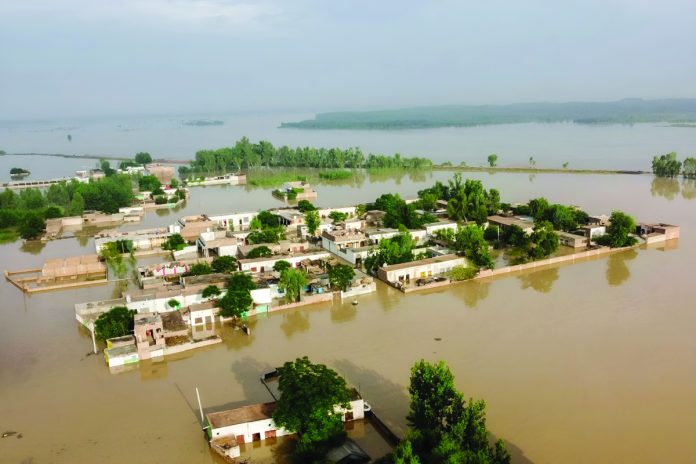Noman Sattar
Any discussion on non-traditional security and related threats needs to take into account security in the ‘traditional’ sense. Security in the traditional sense focused on the military dimension of security. The Cold War years saw security being addressed in the traditional way. The end of the Cold War saw the meaning of security changing in many ways, in the changed geopolitical setting. New thinking brought a change in how security was understood and addressed. This thinking led to ideas of ‘common,’ ‘comprehensive,’ and ‘cooperative’ security. In its non-traditional dimension, security was seen in relation to human and comprehensive security. This can be defined as follows:
Non-traditional security (NTS) issues are challenges to the survival and well-being of people and states that are primarily out of non-military sources, as climate change, resource scarcity, infectious diseases, natural disasters, irregular migration, food shortages, human smuggling, and drug trafficking. NTS concerns and threats are challenges for human survival and well-being. NTS threats are transnational in nature, with regard to origins and effects; these do not arise from competition between states, or shifts in Balance of Power, and can be defined in socio-economic dimensions. These lead to social and political instability. For these threats, national solutions are inadequate; they require regional and multilateral cooperation.
CLIMATE CHANGE has emerged as a major security threat. This refers to long-term shifts in temperatures and weather patterns. This includes global warming, that is, the ongoing increase in global temperatures, and its effects on the Earth’s climate. Many of the issues are driven by human activity, like fossil fuel burning. Fossil fuel burning, deforestation, and some industrial and agricultural activity releases greenhouse gases. These gases absorb heat from the Earth (sunlight) and warm the lower atmosphere. Global warming has gone up by about 50% in recent years. Climate change has an increasingly large impact on the environment, on the land, and on water.
Climate change poses a real challenge to the world; the world has responded to it under the UN Framework Convention on Climate Change (UNFCCC) at major summits. COP 29, held recently at Baku, was a major milestone in addressing the issue that has a political dimension as well. Climate change can lead to displacement and civil unrest, as it affects food and water security and disrupts essential services. According to a World Bank Report, around 143 million people in Asia, sub-Saharan Africa, and Latin America could end up migrating due to climate impacts. This could lead to poverty, social inequality, political instability, and violence.
According to the US Department of Defense, Climate change is a ‘threat multiplier,’ as it increases existing environmental stresses and security risks. Pakistan ranks among the ten most affected countries due to climate change; recent floods bear testament to the ravages caused by climate change. The Government has undertaken various measures to address the issue under the Ministry of Climate Change. The rise of NON-STATE ACTORS emerged as a new threat in recent times. Modern conflict is no longer between states and between military forces. NSAs as terrorist actors and groups are common, and have the capability to fight states, like ISIS. They have access to technology and resources, and have threatened states, as in the ME. These also appear in the form of organized crime networks, involved in human smuggling and drug trafficking; these operate transnationally, and disrupt the functions of the state, as in the case of drug cartels in Latin America. These networks are more active in weak states.
TERRORISM has posed a major threat to state security after the terrorist attacks in the US in September 2001. These networks have a global agenda and sleeper cells in many countries; these continue to threaten states. While Pakistan has fought alongside the US in WOT, it has been a major victim of terrorism and has lost thousands of lives in fighting it. Terrorism continues to pose a threat to Pakistan’s security. The information and communication revolution in the 21st century has focused attention on information warfare. CYBER CONFLICT and war are seen as a new threat to state security. There have been many instances of breach of state security through cyber warfare. It is said that no country is secure from cyber warriors, while countries are taking stringent measures to meet this challenge.
A few years back, the COVID-19 pandemic emerged as a new health hazard and security threat. It affected both the developed and the developing world, and took a heavy toll. All countries, with the support of the WHO, took drastic measures to address the biggest health challenge of recent times. States remain vulnerable to such threats in the future. Political and social unrest, as well as climate change, force many people to relocate and migrate. This has been a major challenge in recent times, as millions have been forced to migrate to escape political persecution and violence. The migration of the Syrians in the wake of the civil war became a serious demographic and political issue in Europe in recent times. This trend remains a major concern, as well as a threat to the national security of affected countries. Non-traditional security threats take many forms and pose challenges to the world at large. It needs to be realized that security is now to be viewed in a new, human security dimension. States alone cannot handle these threats. Such threats can be addressed through a comprehensive, cooperative approach.
The author of this article is a former faculty member of Quaid-e-Azam University and is now associated with the National Defense University, Islamabad.







